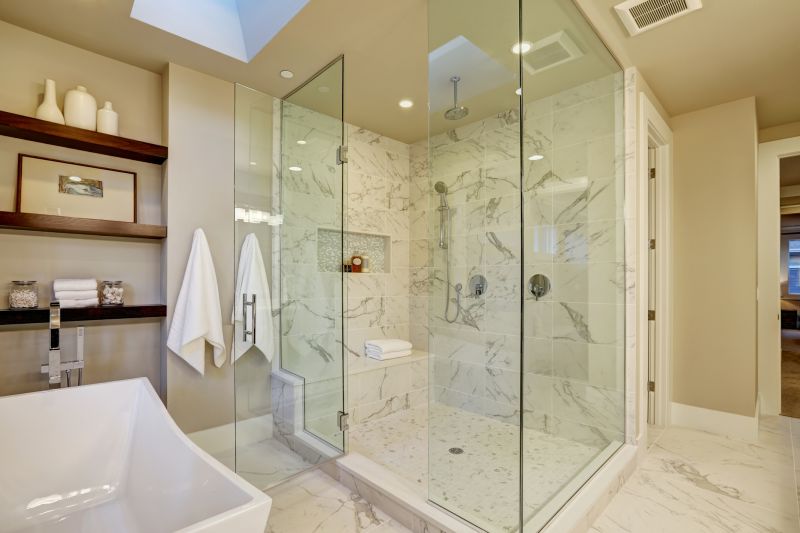Expert Picks For Shower Surround Installation Essentials And Accessories
Discover the must-have products recommended by professionals for a smooth and efficient shower surround installation process.
 Selecting the right products for shower surround installations is essential for creating a functional and visually appealing bathroom space. Shower surrounds can vary widely in style, material, and installation method, making it important to understand the options available. From prefabricated panels to custom tile systems, there are solutions suited for different skill levels and design preferences. Properly chosen products can enhance waterproofing, durability, and overall aesthetic appeal, ensuring a long-lasting shower environment.
Selecting the right products for shower surround installations is essential for creating a functional and visually appealing bathroom space. Shower surrounds can vary widely in style, material, and installation method, making it important to understand the options available. From prefabricated panels to custom tile systems, there are solutions suited for different skill levels and design preferences. Properly chosen products can enhance waterproofing, durability, and overall aesthetic appeal, ensuring a long-lasting shower environment.
Top Overall Option
Prefabricated Shower Wall Panels
Prefabricated shower wall panels are a popular choice for their ease of installation and versatility. Made from materials such as acrylic, fiberglass, or composite resins, these panels are designed to fit standard shower dimensions and often come with integrated waterproof features. They can be quickly installed over existing surfaces or as part of a new shower build, reducing the need for extensive tiling or waterproofing work. Their variety of colors, textures, and finishes allows for customization to match different bathroom styles. Due to their durable, non-porous surfaces, they require minimal maintenance and are resistant to mold and mildew, making them a practical solution for many homeowners.
Types of Products For Shower Surround Installations
Acrylic Shower Wall Panels
Lightweight and easy to clean, acrylic panels provide a smooth, glossy finish that resists moisture and stains.
Fiberglass Shower Surrounds
Durable and affordable, fiberglass surrounds are available in various colors and textures, suitable for quick upgrades.
PVC Wall Panels
PVC panels are waterproof, easy to install, and come in many decorative styles, ideal for DIY projects.
Tile and Grout Systems
Traditional tile systems offer customization and a classic look, requiring careful waterproofing and sealing.
Solid Surface Panels
Engineered materials that mimic stone or quartz, providing a seamless and high-end appearance.
Stone Veneer Panels
Natural or cultured stone panels add texture and a luxurious feel to shower surrounds.
Glass Shower Walls
Tempered glass panels create a modern, open look and are easy to clean with appropriate cleaners.
Waterproof Wallboards
Specialized wallboards designed to resist moisture and mold, suitable as a base for tile or panels.
Decorative Wall Coverings
Vinyl or laminate coverings that mimic tile or stone, offering quick aesthetic upgrades.
Modular Shower Panel Systems
Interlocking panels that simplify installation and allow for easy replacement or updates.
Epoxy Coated Panels
Panels coated with epoxy resins for enhanced waterproofing and chemical resistance.
Textured Wall Panels
Panels with embossed patterns or textures to add visual interest and hide imperfections.
Popular Choices
Widely favored for their affordability and ease of installation, acrylic panels are a common choice for many bathrooms.
Popular for quick updates and low maintenance, fiberglass surrounds come in many styles and colors.
Known for their waterproof qualities and simple installation, PVC panels are frequently selected for DIY projects.
A classic option appreciated for its customization potential, despite requiring more maintenance.
Chosen for their seamless appearance and durability, solid surface materials are trending in modern bathrooms.
Offering a sleek, contemporary look, tempered glass is a popular choice for upscale shower enclosures.
Often used as a base for tile or panels, these wallboards are favored for their moisture resistance.
Quick to install and available in many designs, these coverings are popular for cost-effective updates.
Their ease of installation and flexibility make modular systems a trending option for many homeowners.
Resistant to chemicals and moisture, epoxy-coated panels are gaining popularity in high-use bathrooms.
When considering shower surround products, factors such as water resistance, ease of installation, maintenance requirements, and compatibility with existing bathroom fixtures come into play. Many modern options incorporate innovative materials that resist mold and mildew, making cleaning and upkeep more manageable. Additionally, the choice of color, texture, and finish can significantly influence the bathroom's style, whether aiming for a sleek contemporary look or a more traditional appearance.
Installation methods vary from simple peel-and-stick panels to more involved tile and grout systems. For DIY enthusiasts, user-friendly options with clear instructions and minimal tools are often preferred. Professional installations might opt for custom-cut materials or waterproof wallboards that require specialized skills. Regardless of the approach, selecting high-quality products designed specifically for shower surrounds can contribute to a successful, long-lasting result.
Ultimately, understanding the range of available products and their features helps homeowners and contractors make informed decisions. Proper preparation, choosing the right materials, and following installation guidelines are key steps toward achieving a durable and attractive shower enclosure. Whether upgrading an existing shower or building a new one, the right products can make the process smoother and the outcome more satisfying.
Key Buying Considerations
- Water resistance and waterproofing features to prevent mold and damage
- Ease of installation, especially if DIY installation is planned
- Material durability and resistance to stains, scratches, and impact
- Maintenance requirements for cleaning and upkeep
- Compatibility with existing bathroom fixtures and space constraints
- Aesthetic options including color, texture, and finish
- Cost and budget considerations, including installation costs
- Availability of replacement parts or panels for future updates
- Warranty and manufacturer support for peace of mind
- Environmental factors such as mold resistance and ventilation needs
- Compatibility with other bathroom materials and design elements
- Installation time and complexity to fit project timelines
- Potential for customization or modular options for future changes
- Sealing and waterproofing features to ensure longevity
- Safety features such as slip-resistant surfaces or rounded edges
